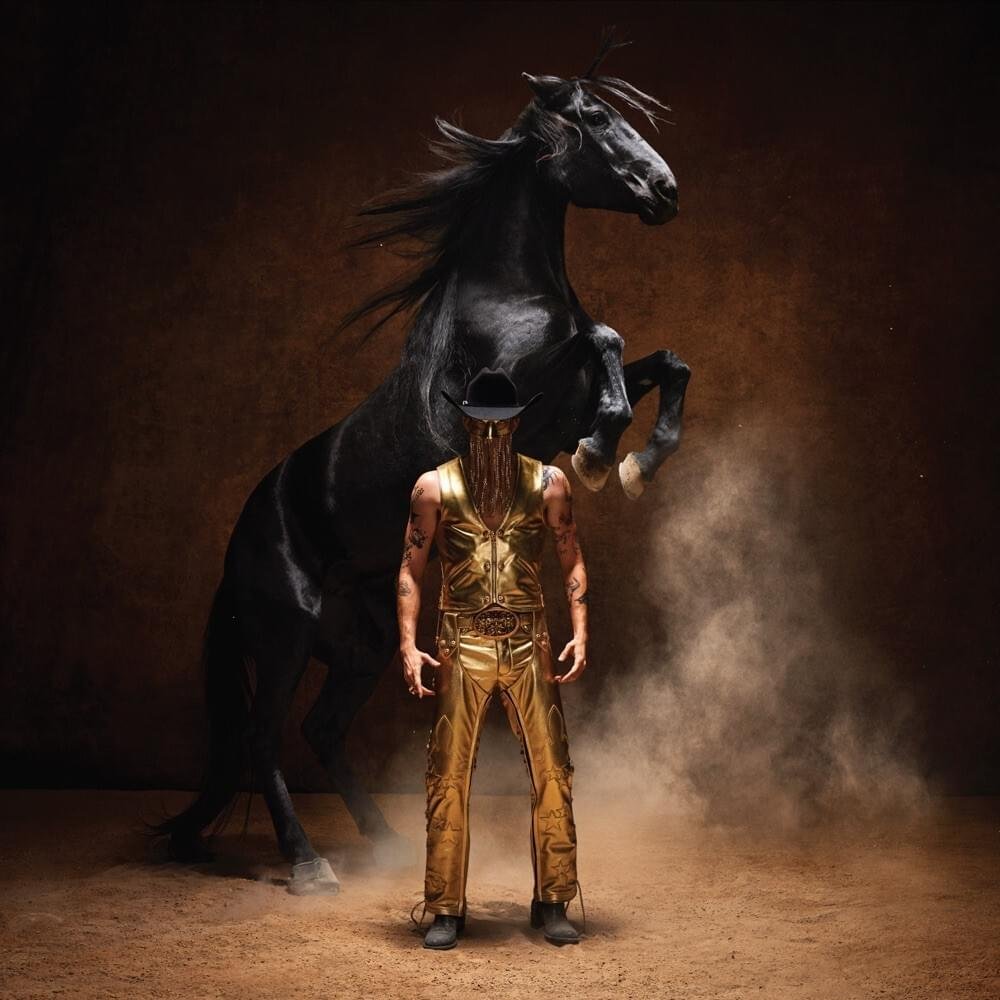album review: 'bronco' by orville peck
I remember when Orville Peck first came out and so many people started asking for me to cover his stuff. Now this was in the middle of 2019, where I wasn’t really taking requests at the time and there was other stuff going on that was pulling me away, but hey, I was always on the lookout for new country music, especially that of a queer, Canadian by way of South Africa stripe, and I had heard him on Bandcamp comfortably before the mainstream had caught on, so I did get around to listening to his critically acclaimed debut album Pony…
And I didn’t really care for it. Don’t get me wrong, I wanted to really like it - Orville Peck’s sonorous vocals seemed to split the difference between Elvis Presley and late 80s Nick Cave, he was a pretty good songwriter, the tunes seemed to be there, but it just wasn’t clicking and that really bothered me. Eventually I settled on the production as the culprit, just feeling underpowered to match the presence of our lead, which I would eventually highlight as a factor as to why his 2020 EP Show Pony didn’t click when I reviewed that. Going back to it now… yeah, it still doesn’t quite work; yes, all the ingredients are here, but it’s not an album that feels like it has the scope to match the scenes and presence Orville Peck delivers with his voice or writing, instead relying on reverb to create smoky mystique that can’t obscure how Peck’s vocals are quieter than they should be and how the grooves don’t have nearly the punch they should. Peck reportedly self-produced the album and while I respect an impressive first time effort for a pretty decent album, Pony just wound up feeling smaller than it should, and while I get how that could create a certain loner, outcast vibe that could coalesce for a few songs, it was a debut that highlighted more potential than anything for me.
And I was not the only one who noticed this - Pony netted a lot of major label attention so alongside his deal with Sub Pop Orville Peck also landed a link with Columbia, which brought him in contact with Jay Joyce. Now I’ve had a very messy history with this guy - see any Eric Church review for that - but Joyce has been more consistent the past few years and if there was someone to give some serious muscle and swell to what Orville Peck was making, Joyce is capable. Now I wasn’t fond of how Peck was staggering this new album’s release across EPs - the drip-feed approach rarely works as well as labels like to think it does - but hey, we’ve got the full album now, what do I think?
Honestly, I’m more than a little annoyed that Orville Peck chose to use the staggered EP release strategy for this… because it’s fantastic! Not only is this some of the best country of 2022, it’s also the sort of burly, varied, and cinematic music that can handle a full-sized release, where the bronco can cut loose and run wild and take you along for the ride. It’s a triumph across the board in such a straightforward way that it might make this a shorter review than expected, but that might be doing a disservice to the sheer breadth of texture and emotional catharsis that it provides - either way, my god I needed this one!
And you know, the easy way to summarize this is that if you liked Pony, this is it on steroids, where it all feels bigger, sweeping across the open windswept prairies and where you can finally get the most out of Orville Peck as a theatrical performer, but simply going bigger is not as easy as it might seem, especially given Jay Joyce’s tendencies to strip out of the groove for a clunkier brand of ‘epic’. Not so here - I would bet early on in the process he realized that Orville Peck’s approach to classic 60s and 70s country paired with a smattering of AM rock needed very little augmentation, just a more robust sense of dynamics and scope, so in opening up the mix not only do we get those bass grooves I was hunting for on Pony, but also allows Peck to come into his own as a singer with the full stage to work with. And strangely this is where you’ll encounter a bit of controversy, as some have raised allegations that this added exposure has highlighted Orville Peck’s limitations as a singer, specifically in the Elvis Presley comparison with some of the touches of trembling vibrato. But I don’t regard it as a negative here - while both men were theatrical in their time, their choice of tones and enunciation feel different especially in the context of the album, there’s a lot less gimmicky Elvis impersonation or karaoke than some have implied, and Peck’s classically trained moments can add his own flourish, be it in gruffer timbres that don’t open up to a full howl, a warmth that characterizes the more intimate ballads that doesn’t go for a more stately presence like Elvis had, or just in how he opens up in his higher register to astoundingly good effect. His cadence also feels more grounded in late 60s / early 70s countrypolitan tones, less so the earliest country and rockabilly Elvis used; a little less goth this time around too, but he works it to his benefit… but the other side to so thoroughly commanding the stage is that he still does not have any chemistry on duets, so the closing ballad ‘All I Can Say’ with his bandmate Bria Salmena just does not work as strongly; she just doesn’t have the presence or power to match him.
And that’s the thing when you blow up the stage to sound as huge as so much of this album does, it’s a rare performer that can make use of it, and I’ll give Jay Joyce a lot of credit for keeping the acoustics, electric guitars, pedal steel, strings, and banjo sounding as warm and organic as he does, not washed out by this mix while still keeping the grooves supple and propulsive. Sometimes he uses it to ramp up the tempo, like the surf rock-tinged opener ‘Daytona Sand’ with the twinkling elements splashing off the galloping snares, the swaggering stomp of the title track, or the old-school patter of ‘Any Turn’, but then you will get the ballads that make use of a more spare arrangement: that incredibly sweet guitar lick within ‘Trample Out The Days’, how the smoky harmonica plays into the gentle smolder of ‘Kalahari Down’ where the swells of strings sound incredible, to the even more spare pieces like the stunning piano ballad of ‘Let Me Drown’ and the acoustic ballad ‘City Of Gold’. Hell, even some of the mid-paced songs work remarkably well - the AM rock-inflected ‘Out Of Time’ with those vocal harmonies on the hook, the liquid bass off the patter of textured percussion on ‘The Curse Of The Blackened Eye’, the acoustic and banjo interplay on ‘Hexie Mountains’, even the melodies on ‘Blush’ where Peck has highlighted a Beatles influence and you can kind of hear it in the lead melody that had its smoky 70s vibe. If I have any small critiques, some of the grooves and transitions could feel a bit choppy - ‘Lafayette’ in particular felt kind of jerky in its Western tones, the lead single ‘C’Mon Baby Cry’ switches dramatically for the hook and it did take some time to grow on me - but the surprise probably came with ‘Iris Rose’, where the infusion of some horns off the rollick of the snares and banjos fell a little flat. A little odd because everywhere else Orville Peck can wrangle the theatricality to his advantage, but maybe it’s how the horns don’t quite match the more understated warmth of the verses and content; the one case where Jay Joyce got a little clunky with the arrangement, that’s a far better batting average than he usually has with these sorts of albums! But I also appreciate how the album despite being firmly rooted in old-fashioned melodies and tones doesn’t feel indebted to the past - there’s no record crackle or play to a more cartoonish theatricality or machismo, one reason I don’t think the Elvis comparison always holds up.
And that’s only reinforced by the lyrics and content, where if Pony was shy and nudging around the shadows and Show Pony was tentative, Bronco swings for the fences consistently, and to Orville Peck’s credit doesn’t shy away from topics that would normally be out of scope for the old-fashioned cowboys of old. It’s worth mentioning that this album doesn’t skirt around any gay content - it’s presented as matter-of-factly as any relationship on this album, absolutely the right choice - but what I appreciate is how Peck uses these bigger scenes to showcase masculine emotionality on a bigger scale. I love the frustrated give-and-take of ‘The Curse of the Blackened Eye’ exploring abusive relationships, where he thinks art will help him wrangle these difficult feelings only to realize it may have made them inescapable, or how ‘C’mon Baby Cry’ is urging guys to let down their emotional guards, or how the love letter to London that is ‘Blush’ might as well have as much exasperation that he’s still struggling to understand men as much as anyone; doesn’t know much about love, but he gives it a try every now and then. That wry sense of humour does a lot consistently, for the tour songs of ‘Outta Time’ and ‘Any Turn’ where you can tell there’s a little social awkwardness that feels well-realized, but also a certain distance from he’s working to contextualize, longings that go unfulfilled on ‘Daytona Sand’ or exes who feel just as much from a different time like on ‘Lafayette’ or ‘Trample Out The Days’. And that sense of being acutely aware of time’s passage adds a lot of pathos to some of the more longing moments, from the windswept ‘Hexie Mountains’ to the multiple songs written from a distance towards his old home in South Africa with ‘Kalahari Down’ and ‘City Of Gold’. But the song I think stands as one of the most potent moments is ‘Let Me Drown’, where he confronts his own depression and angst and doesn’t just pour it all out, but then throws the cowboy line, ‘this town just ain’t big enough for the both of us’. Is it a little ridiculous to lean on old-fashioned iconography like that in order to confront more complicated angst, sure… but there’s an emotional truth to it that makes me realize I don’t really care, it’s repurposing cultural mythmaking to cast a new modern cowboy, and the catharsis of it feels both old and new.
After all, your legends should evolve with you, and Orville Peck proves here that they absolutely can. And let’s be blunt: Bronco kicks a ton of ass! The melodies are rich and impeccably balanced, the album is as anthemic as it can be intimate, covering a breadth that few albums have the ambition to approach, and Orville Peck proves that he can be that figure to ride the stallion across that stage. It’s tempered without feeling old, it’s cinematic without feeling overblown, and it’s heartfelt without spilling into melodrama… and a damn excellent country album to boot. One of the best of 2022, extremely high recommendation, check it out!

